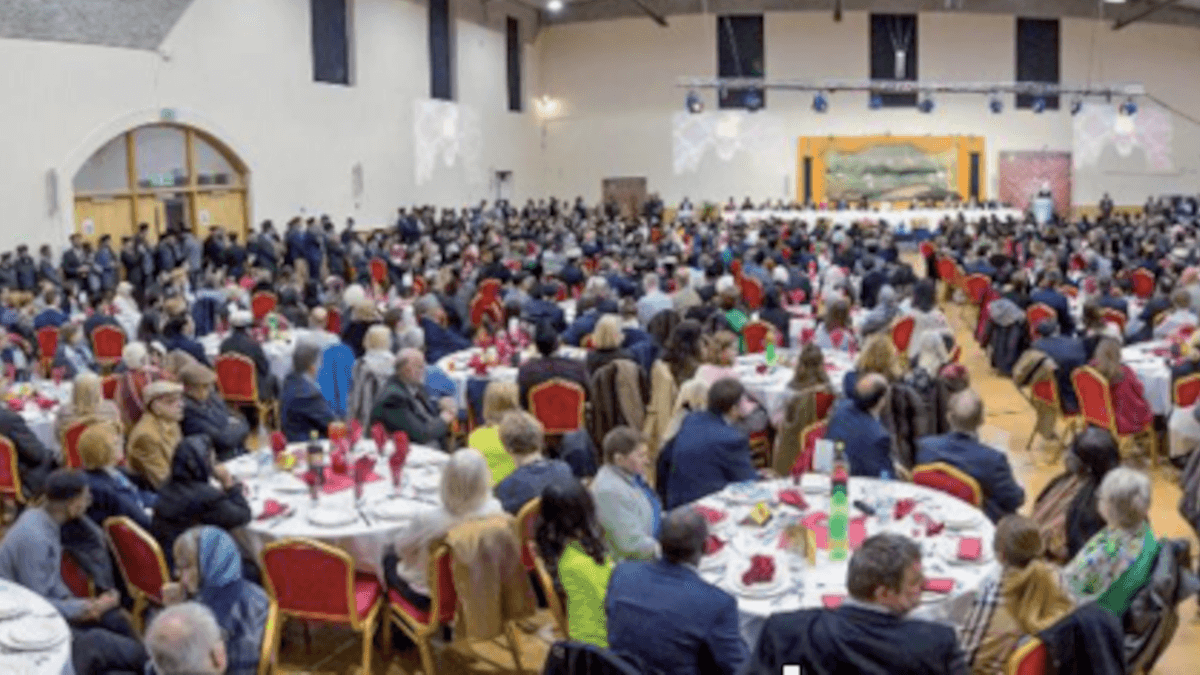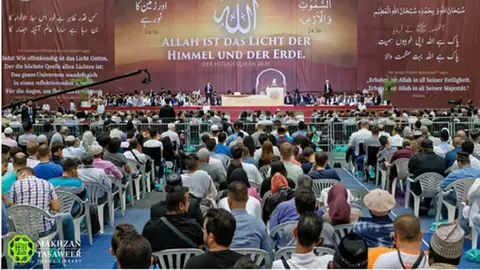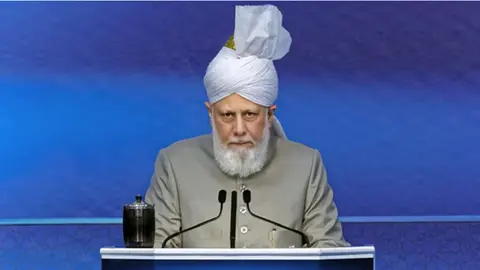Global conflicts and the need for justice (I)

On 25 March 2017, the Supreme Leader of the Ahmadiyya Muslim Community, the Fifth Khalifa, His Holiness Hazrat Mirza Masrur Ahmad delivered the keynote address at the Annual Peace Symposium, organised by the Ahmadiyya Muslim Community of the United Kingdom.
The event took place at the Baitul Futuh Mosque in London, before an audience of over a thousand people from 30 different countries, including over 600 non-Ahmadi guests comprising government ministers, ambassadors, members of parliament and various other dignitaries and guests. During the event, His Holiness presented the Ahmadiyya Muslim Award to Setsuko Thurlow, a survivor of the Hiroshima bombing and peace activist, in recognition of her great efforts in the fight against nuclear disarmament.
His Holiness Hazrat Mirza Masrur Ahmad said:
"Distinguished guests, Assalamo Alaikum Wa Rahmatul'lahe Wa Barakatohu, may the peace and blessings of Al'lah be upon you.
Firstly, I would like to convey my sincere condolences to all those affected by last Wednesday's terrorist attack in Westminster. Our thoughts and prayers are with the people of London at this tragic time. On behalf of the Ahmadiyya Muslim Community, I would like to make it categorically clear that we condemn all such terrorist acts and offer our sincere condolences to the victims of this barbarity. In all parts of the world, the Ahmadiyya Muslim Community seeks to promote peace and speak out against these brutalities in accordance with the teachings of Islam.
This Annual Peace Symposium is also an important part of this effort. I would like to thank all our guests for joining us here tonight.
The Founder of the Ahmadiyya Muslim Community said that he was sent at this time by Almighty God in obedience to the Holy Prophet of Islam, Muhammad (lpbD), to promote the two main objectives of Islamic teachings; the first is to draw humanity towards Almighty God and the second is to exhort humanity towards the fulfilment of the rights of others. I believe that these two objectives are the basis for the establishment of true and lasting peace in the world.
As Muslims, we are fortunate that the Qur'an has explained to us that the main purpose of our creation is the worship of Almighty God, preferably in congregation in mosques. Unfortunately, in complete violation of these peaceful objectives, some Muslim groups or individuals have turned their mosques or madrassas into centres of extremism, preaching hatred and inciting others to commit terrorist acts against both non-Muslims and Muslims belonging to different sects of Islam. Not surprisingly, this has provoked widespread fear in the Western world and created the impression that mosques are a source of conflict and disorder. This has led some political groups and organisations in the West to call for mosques to be banned, or at least for some restrictions to be imposed on Muslims. For example, they call for a ban on the hijab, minarets and other Muslim symbols. Unfortunately some Muslims have given others the opportunity to make accusations against the teachings of Islam. A Muslim is not only obliged to offer his prayers, but it is also obligatory for him to take care of the orphans and feed the poor. Otherwise our prayers will be in vain. This is clearly mentioned in verses three, four and five of chapter 107 of the Holy Qur'an.
Based on these teachings, the Ahmadiyya Muslim Community, with the Grace of God, is carrying out various humanitarian projects to alleviate the pain and adversity suffered by the underprivileged people, irrespective of creed, caste or colour. We have established hospitals, schools and institutes providing health care and education in the most impoverished and remote areas of the world. We do not claim any recognition for these actions, for our only desire is to help these people to stand on their own feet, so that they can fulfil their desires and aspirations and thus live in dignity and freedom. In this way, instead of being frustrated and prone to extremism, they will grow up as responsible and loyal citizens of their nations. At the same time they will develop as individuals, help their nation to progress and inspire others to follow in their footsteps.

Similarly, a fundamental teaching of Islam is that Muslims should live peacefully with other members of society and never cause them any harm or suffering. Despite this, many people associate Islam with violence and war, although nothing could be further from the truth. Whatever terrorists may proclaim, under no circumstances can indiscriminate attacks or killings be justified. Islam has established the sanctity of human life. Chapter 5, verse 33 of the Holy Qur'an states: "Whoever kills one person... it is as if he has killed all mankind; but whoever gives life to one, it is as if he has given life to all mankind". This is a very clear and categorical statement.
People often ask why there were wars in the early Islamic era. Similarly they ask why terrorism is perpetrated in the name of Islam. To answer this question, I always quote two verses from Chapter 22 of the Holy Qur'an, where permission was first granted to the early Muslims to conduct defensive warfare. In chapter 22, verse 40, Al'lah the Almighty says:
"Permission is given to fight to those who are fought, because they have been wronged, and Al'lah has indeed power to help them."
In the following verse, the Qur'an describes the reasons why the Holy Prophet of Islam (lpbD) was granted permission to engage in warfare. Chapter 22, verse 41 states:
"Those who were unjustly expelled from their homes only because they said: 'Our Lord is Al'lah.' And if Al'lah had not permitted men to defend themselves against the unjust action of others, certainly monasteries and churches, synagogues and mosques, in which the name of Al'lah is frequently commemorated, would have been destroyed. But Al'lah will indeed help whoever helps Him. Al'lah is indeed Mighty, Mighty".
What do these verses prove? They clearly show that they do not give Muslims licence to inflict cruelty or shed the blood of others, but instead establish the duty of Muslims to protect other religions and to guarantee the right of all people to believe in whatever they please, without any compulsion or coercion. Islam is thus the religion that establishes the universal principles of freedom of religion, freedom of conscience and freedom of faith until posterity.
Therefore, if today there are certain groups or sects called "Muslims" who are engaged in killing people, they can only be condemned in the harshest terms. Their barbaric acts constitute a flagrant violation of all that Islam stands for. It must be clear that such people are ignorant of the faith they purport to follow.
For example, Mr. Sven Mary, a lawyer representing one of the terrorists involved in the Brussels and Paris terrorist attacks, recently gave an interview to a French newspaper, in which he described his client as having no real knowledge of Islam. Indeed, when asked if he had ever read the Koran, his client readily admitted that he had not, but had only read its interpretation online. Moreover, a research paper published by the Royal Institute for International Relations in March 2016 also concluded that terrorists who identified themselves as Muslims had little or no knowledge of its teachings. Regarding the profile of young Muslims who have become radicalised and perpetrated terrorist attacks in the West, the report says: "Their familiarity with religious thought is undoubtedly more superficial and insubstantial than that of their predecessors, as is their knowledge of international politics ... Injustice was often the starting point of their predecessors' journey into extremism and terrorism. Now this has been eclipsed by personal grievances and motives, the main drivers of their journey.
Moreover, in an essay in the Washington Post, Belgian counter-terrorism official Alan Grignard said: "Their rebellion against society manifests itself through petty crime and delinquency. Many are part of street gangs. What the Islamic State has generated is a new stream of Islam that has legitimised its radical approach".
(lpbD) - may God's peace and blessings be upon him.
(lpbD) - peace be upon him.
(We will continue this discourse in the next installment: "WORLD CONFLICTS AND THE NEED FOR JUSTICE (II)".



